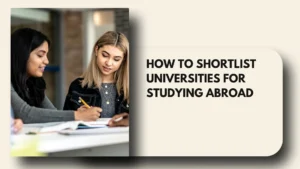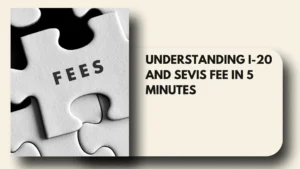
- 1. What is the student visa application fee for Australia Subclass 500 in 2026?
- 2. How much does it cost to study in Australia for international students?
- 3. Can international students work part-time while studying in Australia?
- 4. What is OSHC (Overseas Student Health Cover) and how much does it cost?
- 5. Which universities in Australia rank highest in the World?
- 6. What is the Post-Study Work Visa duration and age limit for graduates in Australia?
- 7. When should Indian students apply for Australian universities for 2026 intakes?
- 8. Can I bring my spouse or children on a student visa to Australia?
- 9. What English test scores are required for an Australian student visa?
- 10. What accommodation options are available for students in Australia and their costs?
- 11. Is Australia a safe country for international students?
- 12. What is the Genuine Student requirement for an Australian visa?
- 13. How do international students set up banking in Australia?
- 14. Are scholarships available for Indian students studying in Australia?
- 15. What are public transport costs with student concessions in Australia?
- 16. What cultural differences should Indian students know before studying in Australia?
- 17. Can students travel to other countries during holidays from Australia?
- 18. What support services do Australian universities offer international students?
- 19. How do international students handle medical emergencies in Australia?
- 20. What are the career options after graduation from Australian universities?
- Key Takeaways
Deciding to study in Australia is an exciting milestone, but the journey often comes with many questions. With Indian students now making up roughly 17% of all international students, it’s clear that Australia remains a top study destination. The country’s appeal lies in its world-class education and vibrant student life. Still, to truly make the most of this experience, you must be well-informed about everything from student visa to living costs, work rights to cultural adjustments.
In this blog, we’ve compiled the 20 most essential questions every Indian student must know before packing their bags for Australia.
1. What is the student visa application fee for Australia Subclass 500 in 2026?
The Australian student visa (Subclass 500) fee is AUD 2,000 (₹1L). You must demonstrate access to AUD 29,710 (₹17L) for annual living expenses, plus one year’s tuition fees, and provide a Confirmation of Enrolment (CoE) for a successful visa application.
2. How much does it cost to study in Australia for international students?
Studying in Australia costs about ₹36–43 lakh for the first year, including tuition, living, and visa expenses. Bachelor’s courses range from AUD 20,000–50,000, Master’s from AUD 22,000–60,000, and monthly living costs average AUD 1,600–2,900 depending on the city.
3. Can international students work part-time while studying in Australia?
Studying in Australia costs about ₹36–43 lakh for the first year, including tuition, living, and visa expenses. Bachelor’s courses range from AUD 20,000–50,000, Master’s from AUD 22,000–60,000, and monthly living costs average AUD 1,600–2,900 depending on the city.
4. What is OSHC (Overseas Student Health Cover) and how much does it cost?
OSHC is compulsory health insurance for international students in Australia, costing AUD 630–800 per year for single cover. It includes doctor visits, hospital care, and emergency ambulance, but not dental, optical, or physiotherapy. Providers include Allianz, Bupa, Medibank, NIB, and AHM.
5. Which universities in Australia rank highest in the World?
According to the QS World University Rankings 2026, the top Australian universities are: the University of Melbourne (#19), UNSW Sydney (#20), the University of Sydney (#25), the Australian National University (#32), and Monash University (#36).
6. What is the Post-Study Work Visa duration and age limit for graduates in Australia?
The Temporary Graduate Visa (Subclass 485) lets international graduates stay and work in Australia after completing their studies. Bachelor’s holders can stay up to 2 years, STEM honours graduates up to 3 years, Master’s graduates up to 3 years, and PhD holders up to 4 years. The age limit is 35 years, except for Master’s by Research and PhD graduates, who can apply until 50 years.
7. When should Indian students apply for Australian universities for 2026 intakes?
Indian students should apply for Australian universities for 2026 intakes starting in September-November 2025 for the February 2026 intake and February-April 2026 for the July 2026 intake. The February intake is the primary intake with the widest range of courses in Australia with scholarships, and ample opportunities.
8. Can I bring my spouse or children on a student visa to Australia?
Yes, you can bring your spouse or children on a student visa to Australia. You need additional financial proof: AUD 10,394 per year for your spouse and AUD 4,449 per year per child, plus AUD 13,502 per year for each school-aged child (5-18 years) for schooling costs No borders. All dependents need separate OSHC (health insurance) coverage.
9. What English test scores are required for an Australian student visa?
For the student visa, you need IELTS 6.0 overall (no band below 5.5), PTE 50, or TOEFL iBT 60. Most universities require higher scores: IELTS 6.5-7.0 for postgraduate programs and 6.0-6.5 for undergraduate. For the Post-Study Work Visa (485), you need IELTS 6.5 overall (no band below 5.5) or PTE 57 overall. English test scores remain valid for 24 months for student visas.
10. What accommodation options are available for students in Australia and their costs?
Students in Australia can choose from hostels, shared or private rentals, on-campus housing, and homestays. Prices range between AUD 80–440 weekly, or AUD 450–1,200 monthly for homestays.
11. Is Australia a safe country for international students?
Australia is known for its safety and inclusivity, offering a secure environment for international students. With low crime rates and strong campus safety measures, such as 24/7 security and SafeZone services, students can feel protected. Still, it’s wise to stay alert and take basic safety precautions.
12. What is the Genuine Student requirement for an Australian visa?
The new GS requirement replaces the previous 300-word statement with targeted questions about your reasons for studying in Australia. You’ll need to answer specific questions explaining why you chose your course, institution, and Australia, and how it supports your long-term academic or career plans. Immigration officers use these responses to confirm that your primary purpose for coming to Australia is to study, not for migration or work reasons.
13. How do international students set up banking in Australia?
International students can easily open an Australian bank account before or after arrival. Apply online through your chosen bank’s website with your passport, visa, and CoE to receive a provisional account number within 1–2 days. After arrival, visit a local branch within two weeks for ID verification, then activate your account, collect your debit card, set a PIN, and enable mobile and two-factor authentication.
14. Are scholarships available for Indian students studying in Australia?
Yes, Australia offers several fully funded scholarships for Indian students, including the AGRTP and Australia Awards, which cover tuition, living costs, and health insurance. Others like the John Allwright Fellowship and Maitri Scholarships support research and bilateral study. Many universities also provide merit-based funding..
15. What are public transport costs with student concessions in Australia?
Concession rules differ by state. Most international students are not eligible for transport concessions in New South Wales, while Victoria still runs an International Student Travel Pass for eligible students, though some providers have withdrawn from the scheme. Queensland has a 50-cent flat fare scheme for tertiary students. Full fare costs vary by city, so check your state transport site or your university for eligibility and current prices.
16. What cultural differences should Indian students know before studying in Australia?
Australians value directness, punctuality and informal communication. Students commonly use lecturers’ first names, active participation is expected, and academic integrity is strictly enforced. Joining orientation and clubs helps with cultural adjustment.
17. Can students travel to other countries during holidays from Australia?
Yes. The Subclass 500 student visa normally allows multiple entries while it is valid. Always check your visa grant, re-entry conditions and the destination country’s entry rules before booking travel. Popular destinations include Bali (visa on arrival), Thailand, Singapore, and Fiji—most require separate tourist visas for Indian citizens. Ensure your Australian student visa and OSHC remain valid for re-entry.
18. What support services do Australian universities offer international students?
Universities typically provide international student offices, academic skills and English support, career services, counselling, health clinics and on-campus safety services. Mental health support is available through university counselling services with confidential appointments. Many of these services are free or subsidised for enrolled students.
19. How do international students handle medical emergencies in Australia?
Call 000 for police, fire, or ambulance emergencies (free call). OSHC covers most treatments at approved medical facilities and bulk-billing doctors. University health centers offer affordable general practitioner services. Keep your OSHC card and medical documents accessible. For mental health support, university counseling services provide free confidential sessions.
20. What are the career options after graduation from Australian universities?
After graduating, Indian students can stay and work in Australia under the Temporary Graduate Visa (Subclass 485) — valid for 2 years after a Bachelor’s, 3 years after a Master’s, and 4 years after a PhD. Once it expires, students can apply for Skilled, State-Nominated, or Employer-Sponsored visas to pursue permanent residency.
Key Takeaways
Australia remains a top choice for Indian students, home to nine universities ranked among the world’s top 100 for 2025. The country offers post-study work rights under the Temporary Graduate Visa (Subclass 485), allowing graduates to stay for two to four years depending on their qualification, and provides clear pathways to permanent residency. With thoughtful planning across visa preparation, finances, and English requirements, studying in Australia can become a strong foundation for career success and long-term settlement in one of the world’s safest and most welcoming nations.
Start your Australian education journey with confidence. AdmitX provides end-to-end support from university selection to visa approval. Our services include:
- University Selection Guidance
- SOP Review
- Study-Abroad Document Templates
- Free IELTS Bootcamp Course
- Scholarship Assistance
- Visa Support Services
And much more!
Book your FREE study abroad counselling session with our experts today!
If you are an aspirant looking to study at your dream university, book an appointment with AdmitX today and start your applications early to avail yourself of all the benefits.















